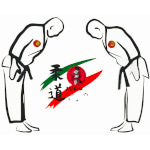World Judo Day Date in the current year: October 28, 2026
 World Judo Day is celebrated annually on October 28. It was established by the International Judo Federation, the international governing body for the Japanese martial art and combat sport of judo.
World Judo Day is celebrated annually on October 28. It was established by the International Judo Federation, the international governing body for the Japanese martial art and combat sport of judo.Judo is a Japanese martial art and combat sport that was created in 1882 by the Japanese educator and politician Kanō Jigorō. He became interested in jujutsu during his teenage years, but had difficulty finding a teacher due to the decline of the martial art after the Meiji Restoration and the subsequent westernization of Japan.
In 1877, Kanō began training with Fukuda Hachinosuke, a teacher of the Tenjin Shin'yō-ryū school of jujutsu. After Fukuda’s death in 1880, he studied with Iso Masamoto, another teacher of the Tenjin Shin'yō-ryū school, and then with Iikubo Tsunetoshi, a teacher of the Kitō-ryū school.
In 1882, Kanō founded his own jujutsu school and dojo. There he developed judo by combining elements of several jujutsu styles, removing striking and the use of weapons, and adding a set of moral principles. The two central principles of judo formulated by Kanō were seiryoku zen'yō (“maximum efficiency, minimum effort” or “good use of energy”) and jita kyōei (“mutual welfare and benefit”).
Judo rose to prominence after it was adopted as the primary martial art of the Tokyo Metropolitan Police Department due to its efficiency. Since then, it has spread throughout the world, becoming the most prominent form of jacket wrestling. The International Judo Federation (IJF) was founded in 1951 when the European Judo Union accepted Argentina as its new member. In 1964, judo became an Olympic sport when it was included in the competition program of the Tokyo Summer Olympics.
Unlike its predecessors, judo emphasizes free sparring (randori) rather than pre-arranged patterns (kata), although kata are still used in training. Judo includes three main groups of techniques: throwing techniques (nage waza), grappling techniques (katame waza), and kicking/striking techniques (atemi waza). However, atemi waza are only included in some kata and are not allowed in free practice and competition.
Kodokan judo, developed by Kanō, is the best known and most widely practiced style of judo. However, a variety of other styles have developed both in and outside of Japan. These include Kosen judo, freestyle judo, Georgian judo, Russian judo, Korean judo, Mongolian judo, French judo, Cuban judo, Azerbaijani judo, and Israeli judo. A number of martial arts, such as sambo and Brazilian jiu-jutsu, have been heavily influenced by judo.
The IJF established World Judo Day in 2011. Its date, October 28, was chosen to commemorate the birthday of Kanō Jigorō. The main goal of the holiday is to celebrate judo through all its educational aspects and to raise the visibility of the sport both within and outside of the judo community.
Each year, the IJF chooses a new theme for World Judo Day to highlight one of the moral values of judo. Past themes have included “Respect”, “Judo for All”, “Perseverance”, “Honor”, “Unity”, “Judo for the World”, “Courage”, “Friendship”, “Plant a Tree”, “Stronger Together”, “Solidarity”, “Inclusion”, “Bring a Friend”, and “Wellbeing”.
- Category
- International Observances
- Tags
- World Judo Day, international observances, sports-related observances, Kanō Jigorō, International Judo Federation